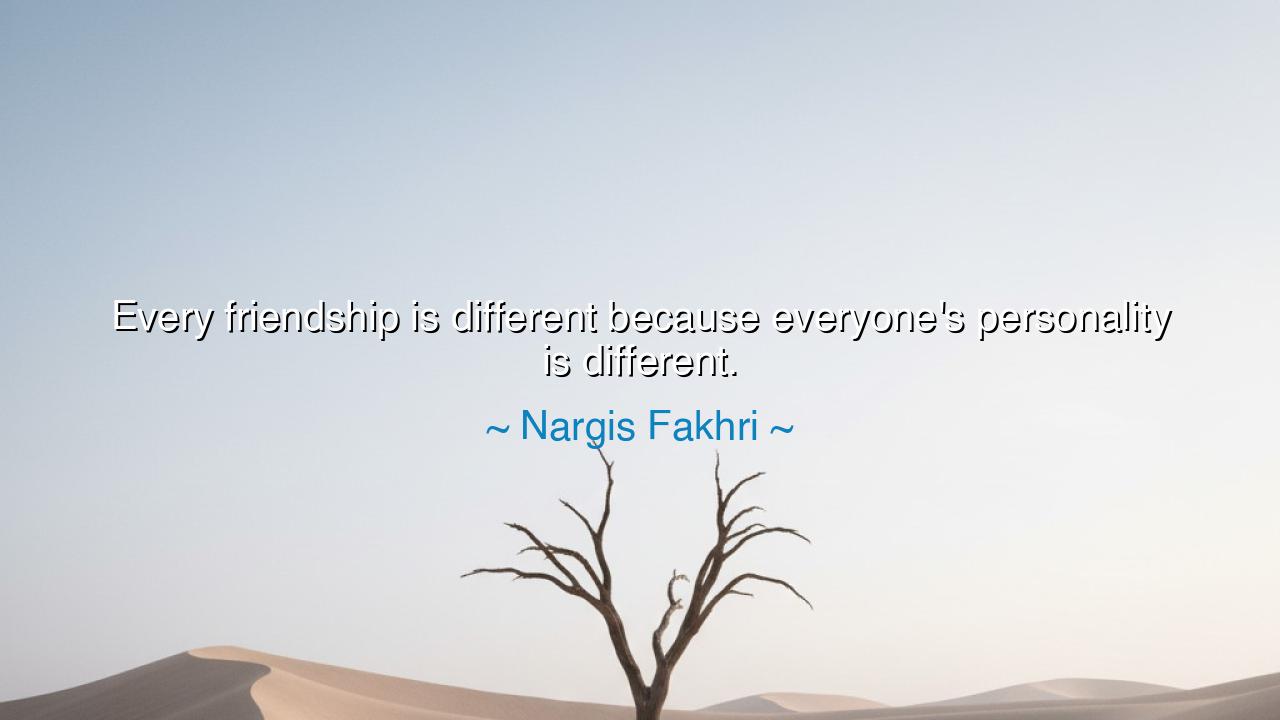
Every friendship is different because everyone's personality is






In the simple yet profound words of Nargis Fakhri, there lies a quiet truth that many live a lifetime to understand: “Every friendship is different because everyone’s personality is different.” These words, though spoken in modern times, echo the wisdom of the ancients, who knew that the soul of one being never mirrors another perfectly. Just as no two leaves upon the same tree share the same pattern of veins, no two friendships unfold in the same way. Each is a living thing, shaped by the distinct spirits of those who share it—an alchemy of personality, time, and circumstance. To see this truth is to understand the delicate art of human connection.
The origin of this insight rests in the deep awareness of individuality. Each person, said the philosophers of old, is a universe unto themselves—born of unique stars, tempered by unique storms. Thus, when two souls meet, their friendship becomes a new constellation, shining with a light that belongs to them alone. Some friendships are like the sun—radiant, joyful, and full of laughter. Others are like the moon—quiet, gentle, and steady through the darkness. Still others, like the tempest, are fierce and passionate, sometimes leaving calm and sometimes chaos in their wake. All are real, all are sacred, and all are necessary to the great harmony of life.
Consider the friendship between Helen Keller and Anne Sullivan, one of history’s most luminous examples. Helen, deaf and blind, lived in a world of silence and shadow, while Anne was a teacher hardened by her own suffering. Their personalities could not have been more different—Helen, fiery and wild in her spirit; Anne, disciplined and patient as the tides. Yet together, they forged a bond that changed both their lives—and the world’s understanding of human potential. Their friendship was not built on sameness, but on difference; not on ease, but on endurance. It was through the friction of their contrasts that something miraculous was born: communication, understanding, and love beyond sight or sound.
This is the heart of Fakhri’s truth. To expect all friendships to look or feel alike is to deny the uniqueness of the human soul. The wise understand that friendship takes many forms. One friend may challenge us with fiery truth, another may soothe us with quiet presence. One may walk beside us for a lifetime; another may appear only for a season, yet leave a mark that endures forever. Each relationship, in its way, reveals something different about who we are—and who we are becoming. Like rivers that carve the same mountain from different sides, our friends shape us through their distinct currents.
There is a deep tenderness in this truth, for it teaches us to accept others as they are, not as we wish them to be. Too often, we measure friendships by our own expectations—demanding that others feel as we feel, act as we act, love as we love. But the world does not ask for sameness; it asks for harmony. The great poet Kahlil Gibran once wrote, “Let there be spaces in your togetherness.” In those spaces, personality breathes. In those spaces, difference becomes beauty. True friendship is not the merging of two souls into one—it is the dance of two souls keeping rhythm without losing themselves.
Thus, to live wisely among friends is to honor their individuality. Do not force your companions into the mold of your own heart; rather, learn the music of theirs. Listen deeply, speak with kindness, and let the diversity of their spirit teach you patience, humility, and wonder. If a friend is distant, seek to understand; if another is bold, let them inspire you. Each personality is a color, and when you embrace them all, your life becomes a tapestry of living light.
And so, dear seeker, take to heart the lesson hidden in Nargis Fakhri’s words: cherish the variety of the souls who walk beside you. Celebrate not what makes them similar to you, but what makes them different. For the beauty of friendship lies not in uniformity, but in contrast—the harmony of many voices singing one song of love and loyalty. In doing so, you will learn the greatest secret of human connection: that friendship, when it honors individuality, becomes a reflection of the divine itself—many hearts, yet one spirit, bound together by understanding.
So go forth and tend your friendships as you would a garden of rare and varied flowers. Give each its light, its space, its care. Do not seek to make them the same, but let each bloom in its own time and shape. For in the end, it is the difference of personalities that makes friendship not only possible, but precious—and the human heart, forever richer for having known it.






AAdministratorAdministrator
Welcome, honored guests. Please leave a comment, we will respond soon